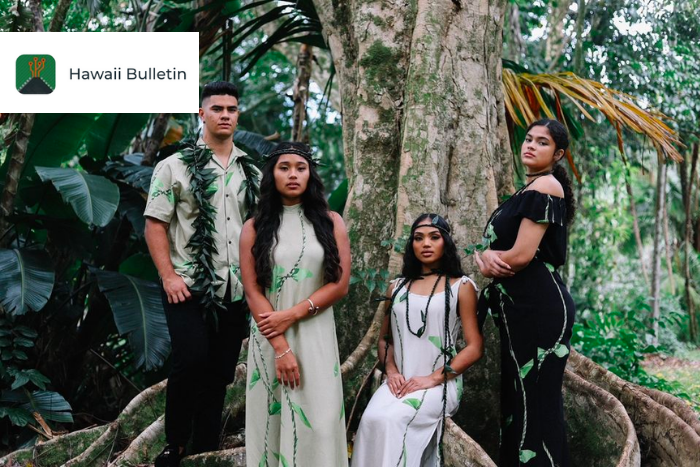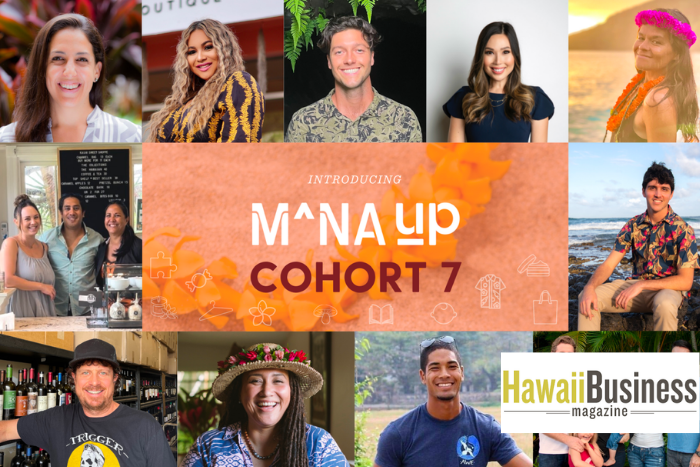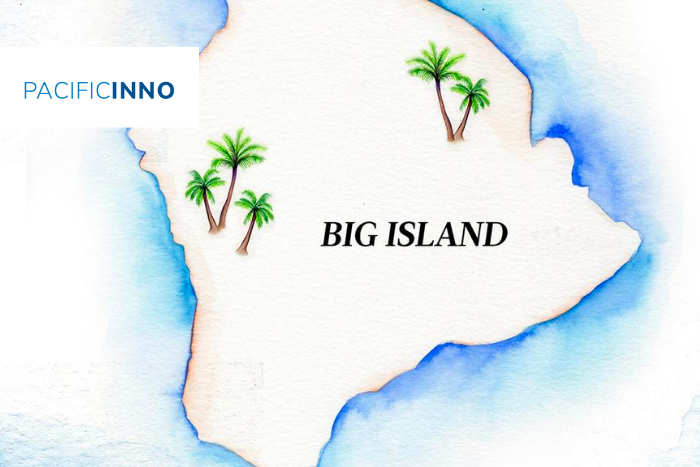Mana Up unveils seventh cohort, opens new shop on Hawaii Island
Environmental stewardship and elevating local artists are among the themes of the eleven latest companies to join the accelerator program.Ryan Kawailani Ozawa
May 23Welcome to Hawaii Bulletin, my newsletter featuring Hawaii tech, science, startups, sustainability and innovation. To receive every issue via email, subscribe here! You can also catch up on past articles on the web, or follow me on Facebook for additional posts and links.

The House of Mana Up pop-up shop in Waikīkī.
It's been a busy week for Meli James and Brittany Heyd, cofounders of the Mana Up Hawaii accelerator program. The pair had not one, but two big announcements to share about their efforts to diversify Hawaii's economy by helping local product companies grow from six- to eight-figure businesses.
I caught them between press releases, promoting a new pop-up shop on Hawaii Island and about to pull the trigger on announcing the full slate of companies that would be embarking on their Mana Up journey next week.
James took a moment to reflect.
"You know, when Brittany and I were formulating the initial idea of Mana Up, both coming from our different experiences — hers in D.C. and mine in San Francisco and Hawaii — we were thinking about how to create an economic development initiative that really is going to be robust for Hawaii," James recalls. "How do we pick industries and companies where it would make sense to not just start here, but to stay here and thrive here?"
Instead of relying on tourists flying here to experience Hawaii, Mana Up elevated local makers and manufacturers so they could meet the global demand for Hawaii products, delivering the aloha spirit around the world. Shoppers everywhere, meanwhile, became more conscientious about where and how the things they buy are made, drawn to authentic, genuine stories and sustainable practices.
It was a multi-faceted win-win scenario. Heyd says there are more than 3,800 products now available on the House of Mana Up online store.
"Here we are, five years later, launching our seventh cohort, and we now have 74 companies and 63 founders, and all of them are still here," she says. "They are thriving, they're all growing, they're all employing people — we now have at least a third at over a million in revenue."

Pō Naturals handcrafts herbal body care products from healing balms to salves.
While this will be the seventh group to go through the intensive, six-month Mana Up program, James and Heyd aren't taking anything for granted.
"It's wonderful that we're able to lean in more into the things that are working, and that we keep evolving, adding in new mentors, new resources, and also new programs," James says.
These included working with companies that were earlier in their lifecycle, helping them prepare to be ready for Mana Up with 'Hawaii Rising' business workshops and Shopify-sponsored startup and e-commerce resources.
Now, Mana Up is piloting a new 'Wayfinder' offering to extend the business development pipeline on the other end. After achieving a million dollars in annual revenue, what's next?
"They have this whole new set of challenges they totally didn't have when they came through the initial program," James explains. "It's a privilege to now figure out how to help them tackle the later stage challenges that these companies have."
Challenges like team building and human resource management, wholesaling and manufacturing at larger scales, and working with national retailers.
"We get to create programming to get them to 10 million dollars, and ten million is where things get also get really exciting," she says. "Not only from a dollars and cents standpoint, but also in job opportunities, for people to be able to come home, creating more C-suite management level job positions, all the kinds of things that we want to see more of in Hawaii."

Founded by Alexis Akiona, LexBreezy Hawaii designs aloha wear and resort wear.
Mana Up had another record breaking group of applicants for cohort number seven. There were 138 applications from local businesses, and the selection committee interviewed 57 of them.
Across the applicant pool, Mana Up found:
-
28 percent had started since the beginning of the pandemic.
-
Applicant companies employed an average of 3.2 people.
-
Most (43 percent) reported $100,000 to $500,000 in annual revenue. 21 percent were making more than $500,000, 36 percent were making less than $100,000.
-
On average, applicant companies were generating 42 percent of their revenue via e-commerce. 13 percent of applicants generated all of their revenue online.
Heyd said the e-commerce statistics were especially interesting.
"Maybe a while ago, some of the companies could take or leave e-commerce at the beginning because they weren't as focused on that, but we're seeing more and more focus on e-commerce as a real strategy for growth," Heyd says. "It is continuing to be that leveling of the playing field for Hawaii, of being able to access external markets without needing to be there."
With companies making the leap into e-commerce earlier and on their own, Heyd says they can get even more out of Mana Up's offerings.
"The things that we're offering are even more impactful for them because they can leverage what they've already built, and it's already a key strategy of theirs," she says. "We will continue to really push on that as a key area of growth and skill set for the companies and the entrepreneurs."

Mahina Tuteur of Surf Shack Puzzles turns local art into puzzles.
After careful consideration, eleven companies were selected for Mana Up's seventh cohort. Seven of the 11 CEOs are women, six are Native Hawaiian, and five come from the neighbor islands.
"We're really excited to continue our tradition of further expanding diversity with our entrepreneur leadership," James notes.
While each of the companies accepted into Mana Up this week are very different, James and Heyd noted the businesses did coalesce around certain themes: conservation and environmentalism, and education.
"Hawaii is an aspirational brand, and for some of our companies, Hawaii is a big piece of it and a home base, but it is sometimes bigger than Hawaii," James notes.
"Looking at sustainability, conservation, environmentalism, health and wellness, education, as well as all these other things, we love that Hawaii is a key piece, but it doesn't have to be the only piece," she adds. "Especially when it translate into other good things that can be exposed and given attention to in the world."
Both James and Heyd were rightfully reluctant to single any one company out as exceptional, but being from Maui, Heyd brought up the Haku Maui company in Makawao as an interesting example.

Haku Maui, founded by Britney Texeira, will focus on both products and experiences.
"It's all around how we elevate lei making in a way that is utilizing Hawaii's native flowers and using that as a real opportunity to educate and share Hawaiian culture," Heyd explains. "The founder really feels like it's a special opportunity to share a lot more about what lei making actually means and then the flowers and the plants that are part of it."
Even so, Haku Maui isn't going to focus on exporting fresh flower lei outside of Hawaii.
"In our traditional world of Mana Up and the focus on consumer packaged goods, this would immediately be something we would think is not going to be a fit," James notes. "But we're always trying to push the needle — how do we elevate a different way of experiencing Hawaii that can also layer into something that can be exportable as well?"
"For the businesses within Mana Up, it's about more than money, it's about their mission," Heyd adds. "With lei, it's sharing a Hawaiian tradition, but it's also working with local flower farmers, many of which have gone out of business, and trying to regenerate that farming activity here, rather than importing flowers."

The eleven companies selected are:
-
Advance Wildlife Education creates a line of educational products including coloring books for keiki featuring hand-drawn artwork and clothing to promote Hawai‘i’s endangered wildlife, outreach and information. Founded by Che Katsu Frausto from Pa‘ia, Maui.
-
Ava + Oliver designs safe, modern baby lifestyle products made with 100% non-toxic food-grade silicone and vegan leather that is free of phthalates and cruelty-free. Founded by Emma Wo from Honolulu.
-
David Shepard Hawaii is an aloha wear design company featuring hand-drawn artistic representations of native Hawaiian plants with a special emphasis on conservation. Founded by David Shepard from Honolulu.
-
Haku Maui specializes in traditional Hawaiian lei and lei making workshops at their shop on Maui. Founded by Britney Texeira from Makawao, Maui.
-
Kauai Sweet Shoppe is a family-owned and operated small batch confectionery manufacturer specializing in handcrafted locally made caramels and chocolates highlighting local flavors. Founded by Chloe Blake and Kalei Marston from Lihue, Kauai.
-
LexBreezy Hawaii designs aloha wear and resort wear with a modern twist, reflecting local culture. Founded by Alexis Akiona from Kailua, Oahu.
-
Mālama Mushrooms is a family-owned functional food company creating everyday wellness products using superfood mushrooms. Founded by Benjamin Lillibridge from Kona, Hawaii Island.
-
Pō Naturals combines ancient Hawaiian medicinals with holistic practices to handcraft herbal body care products from healing balms to salves. Founded by Alohilani Keohuloa from Kohala, Hawaii Island.
-
Revive Glassworks turns repurposed glass bottles into extraordinary products by using an elaborate process with advanced machinery and craftsmanship. Founded by Matt Laundrie in Kahului, Maui.
-
Surf Shack Puzzles is a wahine-owned, ‘ohana-operated puzzle company highlighting Hawai‘i-inspired artwork designed by female artists including Punky Aloha Studio and Aloha de Mele. Founded by Mahina Tuteur from Kahaluu, Oahu.
-
Tag Aloha Co. is a lifestyle brand offering a growing array of locally inspired products including bags, pareos, hats and pillows. Founded by Alana Penaroza, Kainoa Penaroza and AJ White from Kailua, Oahu.
Mana Up Cohort 7 officially kicks off on Tuesday, May 31, and culminates with its Mana Up Showcase event on Thursday, November 3, 2022.

If welcoming a new cohort of companies wasn't enough work, Mana Up also announced its first neighbor island pop-up retail store, where locals and visitors alike can learn about the people and ideas behind made-in-Hawaii products.
It opens at the Mauna Kea Resort on Wednesday, and is scheduled to operate through October.
"It's super exciting," James says, noting that the store will be the second location that combines local storytelling and luxury retail. The first is still open in the Royal Hawaiian Shopping Center in Waikīkī.
"The Waikīkī store is also officially a pop-up, but we've been there for two years," James says. "We've been able to build out the space and almost become kind of an anchor."
"We wanted to test the thesis that a store like this can exist on Kalakaua Avenue with neighbors like Tiffany and Hermes, and whether people want that," she recalls. "We're finding that they absolutely do — lots of locals and tourists come in, and really enjoy the storytelling aspect of our kind of elevated retail experience with narrative, learning about our entrepreneurs and buying their products."
Now the thesis will be tested in a hotel environment. Although most of the foot traffic will be tourists, James said she's hoping Hawaii residents will also check it out.
"I think the Mauna Kea is quite popular with kama‘aina who live up in Waimea, as it's the closest beach, and they have a beach club membership for them," she says.
And James hints that there will be more announcements coming later this summer relating to retail partnerships. Until a store opens near you, however, you can visit houseofmanaup.com and shop online.



